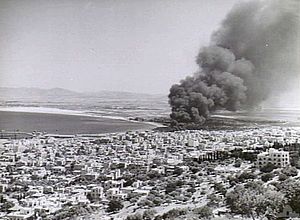Italian bombing of Mandatory Palestine in World War II
 From Wikipedia the free encyclopedia
From Wikipedia the free encyclopedia
| Italian bombing of Mandatory Palestine | |||||||
|---|---|---|---|---|---|---|---|
| Part of the Mediterranean and Middle East theatre of World War II | |||||||
 Haifa refinery destroyed by airstrikes | |||||||
| |||||||
| Belligerents | |||||||
| | |||||||
| Casualties and losses | |||||||
| Unknown | 150+ deaths at the bombing of Tel Aviv 12+ at Haifa Haifa oil refinery damaged | ||||||

The Italian bombing of Mandatory Palestine in World War II was part of an effort by the Royal Italian Air Force (Regia Aeronautica) to strike at the United Kingdom by attacking those parts of the British Empire in the Middle East.
Background
[edit]On 10 June 1940, the Kingdom of Italy declared war on the French Republic and the United Kingdom. The Italian invasion of France was short-lived and the French signed an armistice with the Italians on 25 June, three days after France's armistice with Germany. This left the British and the forces of the Commonwealth of Nations for the Italians to contend with in the Middle East.
Successively on 19 October 1940, four Italian SM.82s bombers attacked American-operated oil refineries in the British Protectorate of Bahrain, damaging the local refineries.[1] The raid also struck Dhahran in Saudi Arabia, but caused little damage.[1]
Bombing campaign
[edit]Starting in July 1940, the Italian bombing of the British Mandate of Palestine was primarily centered on Tel Aviv and Haifa. However, many other coastal towns such as Acre and Jaffa also suffered.[2][3]
The last Italian bombing on the territories of the British Mandate of Palestine occurred in June 1941. Haifa and Tel Aviv were hit, but with little damage and few casualties.
Bombing of Haifa
[edit]Haifa was hit many times by the Italians, targeting the port and refinery, starting in June 1940. The 29 July 1940 issue of Time reported a bombing at Haifa by SM82 bombers during the previous week, with a dozen casualties. The Italians claimed a huge success which the British did not deny.
Where the British oil pipeline from Mosul reaches tidewater, "Ten big Italian bombers, flying at great altitude from the Dodecanese Islands, giving the British bases at Cyprus a wide berth, dropped 50 bombs on the Haifa oil terminal and refinery." The bombing started fires which burned for many days afterwards, and the refinery's production was blocked for nearly one month. British fighters from a base on Mount Carmel were too late to overtake the Italians returning to their base in Italian Dodecanese.[4]
Bombing of Tel Aviv
[edit]On 9 September 1940, a bombing raid on Tel Aviv caused 137 deaths.[5] There was another raid on Tel Aviv on 12 June 1941 with 13 deaths, done by the Italians[6] or by the French, based in Syria.[7]
Historian Alberto Rosselli[8] pinpointed that the bombing of Tel Aviv that killed 137 people was because the Italian bombers were on their way to the strategic port and refineries of Haifa, but were intercepted by British aircraft. Forced to go back, the Italians received orders to drop their bombs on the port of Tel Aviv, but in attempting to avoid the attacking British planes they dropped the bombs by mistake on a civilian area near the port.
Gallery
[edit]- A casualty of the Italian bombing of Tel Aviv on 10 September 1940
- Memorial in Tel Aviv to the 137 killed in the Italian Royal Air Force raid of the city on 9 September 1940.
- Destruction of Muslim graveyard and the Istiklal Mosque by Italian bombers during the bombing of Haifa, September 1940.
See also
[edit]Footnotes
[edit]- ^ a b Air Raid! A Sequel Archived 2012-09-29 at the Wayback Machine Aramco World Magazine, Volume 27, Number 4, July/August 1976.
- ^ "The Italian Bombing" (in Hebrew). Tel Aviv Municipality. Archived from the original on 12 September 2017. Retrieved 10 September 2011.
- ^ Yehuda Lapidot. "Why Italian Planes Bombed Tel-Aviv?". IsraCast. Archived from the original on 21 September 2011. Retrieved 10 September 2011.
- ^ "Southern Theatre: God's Time". Time. New York. 29 July 1940. Archived from the original on August 24, 2010. Retrieved 6 September 2011.
- ^ Omer-Man, Michael (9 September 2011). "This Week in History: Italy bombs Tel Aviv". The Jerusalem Post. Retrieved 6 September 2011.
- ^ "Le Bombe Italiane sul Tel-Aviv, 1940, 1941". Archived from the original on 12 October 2017. Retrieved 31 May 2016.
- ^ Green, David B. (9 September 2013). "This Day in Jewish History 1940: Italy Bombs Tel Aviv During WWII". Haaretz. Tel Aviv. Retrieved 31 May 2016.
- ^ "Alberto Rosselli". Archived from the original on 17 July 2012. Retrieved 31 May 2016.


